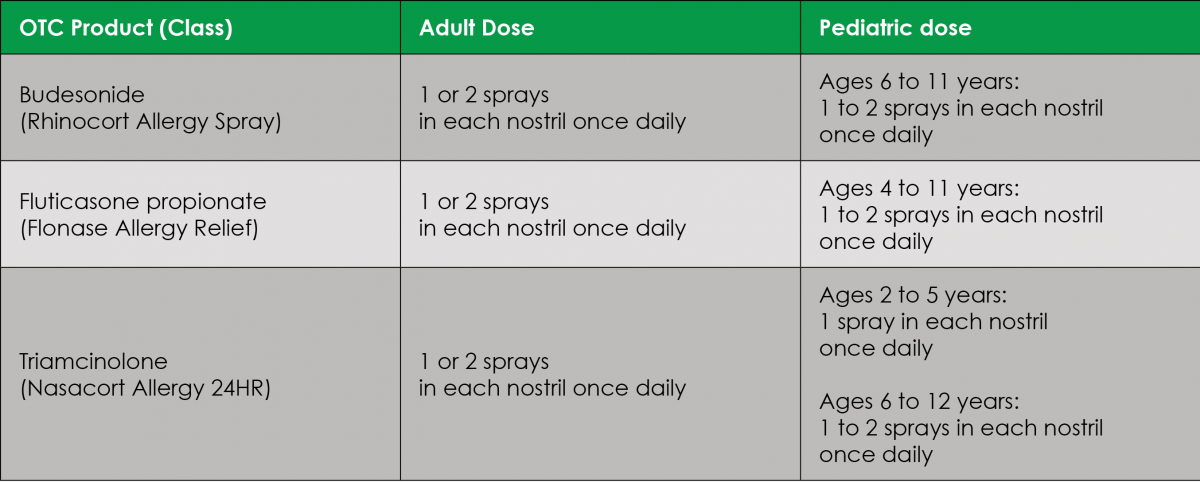Which OTC Allergy Medication is Best for You
Runny nose, watery eyes, nasal itching, sneezing…do any of these sound familiar to you? Many of us suffer from seasonal allergies. Seasonal allergies are usually due to tree pollens in the spring, grass pollens in the summer, and weed pollens in the fall. Some people even suffer from indoor allergies such as animal dander, dust mites, and molds.
The first step to managing allergies is to avoid exposure to allergens that trigger an allergic reaction. People are most commonly exposed to allergens by inhaling them. Outdoor allergens are often responsible for seasonal allergy symptoms while indoor allergens may be responsible for year-round allergy symptoms.
Often, allergens can’t be completely avoided, and drug therapy is needed to decrease or prevent symptoms due to allergies. Common over the counter (OTC) medications used to treat allergies include oral antihistamines, decongestants, and nasal steroids.
Oral Antihistamines
Oral antihistamines are often considered the first-line agents for the treatment of mild to moderate allergy symptoms and are sometimes given in combination with a nasal decongestant or a nasal steroid. These medications are effective in reducing symptoms of itching, sneezing, and runny noses. There are two types of oral antihistamines: first-generation and second-generation antihistamines. For the best symptom relief, antihistamines should be taken either prophylactically (two to five hours before allergen exposure), or on a regular basis if needed chronically.
- Diphenhydramine, dimenhydrinate, chlorpheniramine, and clemastine are first-generation antihistamines that have been available over the counter for years. These commonly cause sedation. These medications may also decrease cognitive and motor skills, leading to difficulty for patients at work or when driving. Some patients, especially children, may notice stimulation effects like insomnia, anxiety, and hallucinations. These should not be used by patients with glaucoma.
- Cetirizine, levocetirizine, fexofenadine, and loratadine are the second-generation antihistamines that are available over the counter. These antihistamines are generally well-tolerated and not as sedating. Cetirizine and levocetirizine may be slightly more sedating than fexofenadine and loratadine.
Nasal Steroids
Nasal steroids are generally the most effective treatment for nasal symptoms of seasonal allergies. They are the first-line option for treating moderate to severe allergic rhinitis, however, the regular use of nasal steroids is often more effective than symptomatic treatment. Additionally, they help mild eye symptoms about as well as oral antihistamines. The most common side effects of using these are nasal irritation and bleeding. Concerns about potential systemic effects from using nasal steroids often arise, but they do not appear to cause adverse events associated with systemic absorption.
- Nasal steroids that are available OTC include triamcinolone, fluticasone, and budesonide. They are all used once daily. Triamcinolone is approved for ages as young as two years, fluticasone is approved for ages four and up, and budesonide is approved for people ages six and up.

Oral Decongestant
An oral decongestant, such as pseudoephedrine, is also effective in reducing nasal congestion caused by allergies. Side effects associated with this include insomnia, loss of appetite, elevated blood pressure, and heart palpitations. Oral decongestants should be avoided in patients taking stimulants for Attention deficit hyperactivity disorder (ADHD) and high blood pressure.
- Pseudoephedrine is available without a prescription in most states, however, sales of these products are restricted due to the methamphetamine epidemic. This medication is only available behind the pharmacy counter or they must be kept in a locked cabinet. Customer identity must be verified at the time of purchase of any regulated products. They must show an acceptable form of identification, and there are limits on the amount of pseudoephedrine that a patient may purchase.
Nasal decongestants, such as phenylephrine or oxymetazoline, are effective in providing short-term relief of nasal congestion, but generally have no effect on itching, sneezing, or runny noses. Limit these to two to three days, since prolonged use can lead to rebound congestion. This generally occurs after five to ten days of treatment, but it can occur in as little as three days. These agents are often useful in providing prompt relief of nasal congestion when used with other anti-allergy agents.
Nasal Saline
Nasal saline can help with symptoms of a runny nose when used alone or with other allergy treatments. Nasal hygiene dilutes and removes irritants from the nasal passages and sinuses. It generally has a few minor side effects, such as burning or stinging in the nose and is relatively inexpensive. This is a reasonable choice for children who are willing and able to use it.
Allergies can significantly affect a patient’s quality of life. The management of allergies includes a combination of allergen avoidance and drug treatment. With most allergy treatment options available OTC, your pharmacist can be influential in helping you choose appropriate treatments for your symptoms.